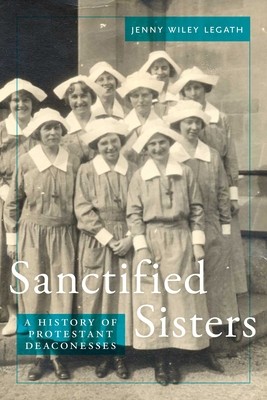
- We will send in 10–14 business days.
- Author: Jenny Wiley Legath
- Publisher: New York University Press
- ISBN-10: 1479860638
- ISBN-13: 9781479860630
- Format: 15.8 x 22.9 x 2.8 cm, kieti viršeliai
- Language: English
- SAVE -10% with code: EXTRA
Reviews
Description
The first history of the deaconess movement in the United States
In the late nineteenth century, a new movement arose within American Protestant Christianity. Unsalaried groups of women began living together, wearing plain dress, and performing nursing, teaching, and other works of welfare. Modeled after the lifestyles of Catholic nuns, these women became America's first deaconesses. Sanctified Sisters, the first history of the deaconess movement in the United States, traces its origins in the late nineteenth century through to its present manifestations. Drawing on archival research, demographic surveys, and material culture evidence, Jenny Wiley Legath offers new insights into who the deaconesses were, how they lived, and what their legacy has been for women in Protestant Christianity. The book argues that the deaconess movement enabled Protestant women--particularly single women--to gain power in a male-dominated Protestant world. They created hundreds of new institutions within Protestantism and created new roles for women within the church. While some who study women's ordination draw a line from the deaconesses' work to the struggle for women's ordination in various branches of Protestant Christianity, Legath argues that most deaconesses were not interested in ordination. Yet, while they didn't mean to, they did end up providing a foundation for today's ordination debates. Their very existence worked to open the possibility of ecclesiastically authorized women's agency.EXTRA 10 % discount with code: EXTRA
The promotion ends in 21d.13:19:51
The discount code is valid when purchasing from 10 €. Discounts do not stack.
- Author: Jenny Wiley Legath
- Publisher: New York University Press
- ISBN-10: 1479860638
- ISBN-13: 9781479860630
- Format: 15.8 x 22.9 x 2.8 cm, kieti viršeliai
- Language: English English
The first history of the deaconess movement in the United States
In the late nineteenth century, a new movement arose within American Protestant Christianity. Unsalaried groups of women began living together, wearing plain dress, and performing nursing, teaching, and other works of welfare. Modeled after the lifestyles of Catholic nuns, these women became America's first deaconesses. Sanctified Sisters, the first history of the deaconess movement in the United States, traces its origins in the late nineteenth century through to its present manifestations. Drawing on archival research, demographic surveys, and material culture evidence, Jenny Wiley Legath offers new insights into who the deaconesses were, how they lived, and what their legacy has been for women in Protestant Christianity. The book argues that the deaconess movement enabled Protestant women--particularly single women--to gain power in a male-dominated Protestant world. They created hundreds of new institutions within Protestantism and created new roles for women within the church. While some who study women's ordination draw a line from the deaconesses' work to the struggle for women's ordination in various branches of Protestant Christianity, Legath argues that most deaconesses were not interested in ordination. Yet, while they didn't mean to, they did end up providing a foundation for today's ordination debates. Their very existence worked to open the possibility of ecclesiastically authorized women's agency.

Reviews